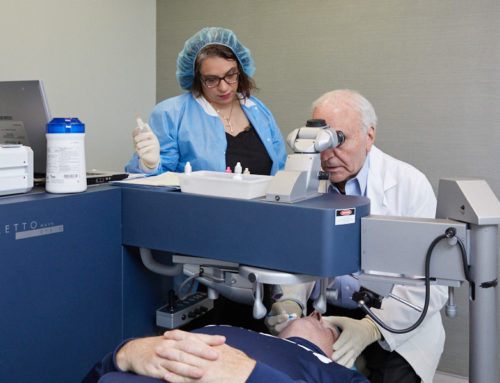A cataract may occur as a result of clouding of the natural lens of the eye, which may lead to the blurring of vision, decrease in contrast sensitivity, night vision problems, and glare. A cataract is considered to be one of the most common causes of treatable blindness globally. This can neither be cured with the help of medication nor can it be treated with glasses. A cataract is the opacification of the clear natural lens. In the process of laser cataract surgery in NJ, the cataract is removed and replaced with an artificial intraocular lens. NJ,
Types of laser cataract surgery
There are two types of cataract surgery performed by eye surgeons. These are –
Phacoemulsification or phaco – In this cataract surgical process, a small incision is made on the side of the cornea, the clear, dome-shaped surface covering the front of the eye. In this surgical procedure, your doctor inserts a tiny probe into the eye. This instrument sends out ultrasonic waves that break apart the lens, making it easy to remove with a suction device. Today, most laser cataract surgery is done by phacoemulsification, also referred to as “small incision cataract surgery.”
Extracapsular surgery – In this cataract surgical process, your doctor makes a longer incision on the side of the cornea and removes the cloudy core of the lens in one piece. Suction is used to take out the rest of the lens.
How does a surgeon perform laser cataract surgery?
In this surgical procedure, an imaging device is first placed over the patient’s eyes to measure the length, breadth, and location of the cataract in the patient’s eye. The eye surgeon then sent this gathered information to a special software computer that programs the laser for the required cataract surgical incision on the patient’s eye. The surgeon makes an incision in the cornea, and a hole is made in the eye’s capsule using a laser. The ultrasound waves from the laser are used to soften the cataract so that lens can easily be broken into pieces and suctioned out. The surgeon then inserts an intraocular lens (IOL) into the eyes of the patient in place of the patient’s natural lens. Cataract surgeons may use various lenses for this surgical procedure depending on the type needed –
Monofocal IOL –
This lens is used for distant vision. With this kind of lens, the patient might need corrective or computer glasses before post-surgery.
Multifocal IOL –
This lens provides a clear vision to a patient. Using this lens, the patient can perform daily activities and does not need any corrective glasses though they might see halos-around light while driving.
Newer Multifocal IOL –
This lens does not cause halos around light while driving and can minimize glare. It comes in two types, i.e., Symfony and trifocal lens. Symfony lenses treat distance and near vision, while the trifocal lens is implanted for near, distant, and intermediate vision.
Benefits of laser treatment for cataracts –
Though many complicated steps need to be performed during the surgical procedure, there are still various benefits of this surgery –
Highly accurate and precise –
In this surgical procedure, femtosecond laser technology is used to make incisions, so this surgical procedure is more precise and accurate.
Blade-free –
The laser breaks up the cataract and creates a small incision to remove the affected lens, compared to traditional surgery, which uses a needle, blades, and handled devices to make an incision.
Lessen downtime –
As the laser breaks up and softens cloudy cataracts after the circular incision has been made, this surgical process takes less energy than traditional cataract surgery. After post-surgery, the patient can resume their usual daily activities within a few days, provided they take the proper medication and necessary precautions.
Increase vision –
Compared to traditional surgery, which can be used for treating cataracts only, laser cataract surgery can correct pre-existing astigmatism.
So, mentioned above is some information about laser cataract surgery. If you are searching for a renowned eye care & surgery center in NJ, look no further than New Jersey Eye Center. We have a team of qualified ophthalmologists who are experts in treating glaucoma disease, cataract treatment, retina disorders, and more.
